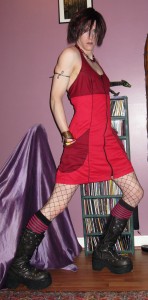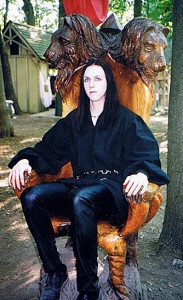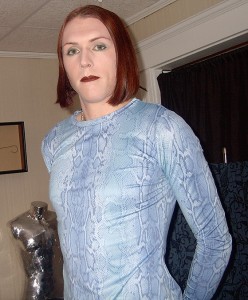When I first heard of David Bowie’s death (Jan 10, 2016), I was mostly indifferent and even slightly annoyed. It seemed my entire (non-work) social sphere expected me to be devastated. Normally, I find it irksome that our celebrity culture encourages people to think they “know” celebrities and be emotionally invested in celebrity lives, so it was that my first knee-jerk response was a “So, what?” mild annoyance, as I’ve never touched or talked with this person. And to be honest, I’ve loved only a small portion of DB’s music, most of it older stuff that I listened to as a teen in the 1990s. I’ve paid little attention to DB or his albums in the 21st century, so it seemed I had little cause to be “affected.”

That said, DB was important to me, so much so that I made a “self-portrait” collage all about him (as me or vice versa) when I was 20: “Rock Starr” (the prints hang in my bedroom). For a time, I even had an email address ending in davidbowie.com (when he had a social networking site in 1999 or so, long before facebook or patreon). David Bowie was a beloved cultural icon/pioneer and hugely important to counterculture as a non-conformist superstar, in the pre-internet days where finding out about independent musicians was quite difficult. DB was a Gender Outlaw inspiration (not only to male-borns, check out 1967’s “She’s Got Medals,” a tale of a drinking, fighting, cross-dressing woman soldier), as well as a White Ally, long before I had any concept of institutional racism (e.g., this 1983 video of him criticizing MTV for not including more black artists in their lineup).
As the weeks have flowed, I find I have a complicated mix of emotions about his passing. Until recently, I hadn’t thought of DB much, my albums sitting gathering dust in my CD rack. Death revived the music and influence for me; I revisited all my old albums and more online. I just rewatched The Stars (Are Out Tonight), one of my favorite music videos, the way it wraps up the legacy of DB with fear of aging, suburbia, obsolescence, being replaceable and of course queering gender like mad. And I don’t even like the music. It’s chilling in its fantastical realness. They’re still them, but not & older, and the youth are taking on the mantle, which is slightly sad, but also reassuring. Mostly, I think, I feel a sublime gratitude for his life and his art, which so profoundly influenced & reinforced my own androgyne identity. I do feel a tang, slightly sour, which might be a touch of sorrow, but it is mostly for the passing of my youth and “hardcore” years (and mortality in general).
I watched the Blackstar video which I found interesting and slightly haunting, but not surprising (some seemed surprised that he’d reference death so clearly just before shedding his mortal coil) – it’s so very him. To me, this is a natural progression of the story in The Stars (Are Out Tonight). More recently, I really enjoyed the Blackstar cover by Jherek Bischoff and Amanda Palmer, because of how well they channel David Bowie’s musical essence (even vocal inflections) in this song, but also in their personas in general – they are part of this generation of Stars and confirm that DB’s legacy still runs strong.
I’ve been pleased to see all the DB-influenced social media posts and creativity that is surging in his wake (so to speak). In Boston, there was a Labyrinth-themed Burlesque show sold out before I heard of it (I saw pictures and it looked fantastic). A few weekends back, I went to a jam-packed and sold-out all-DB dance night. A few local musicians did an amazing cover of Under Pressure as a surprise, and 2 DB videos (old / new) were playing on 2 different walls at all other times; it was called Ashes-to-Ashes, a DB tribute at a night normally called Heroes (which we all were, just for one night). And last weekend, wearing my leopard-print pants, andro as usual, my glam partner & I went to a yoga class that played DB for the entire 1.5 hrs, which was a soothing counterpoint to the challenging poses.

When my childhood restrictions were lifted (when I left home for college), I began “experimenting” at 16 (1994). I didn’t know much David Bowie. I had seen Labyrinth, of course, and some songs from the radio, but I wasn’t “aware” of him, in any significant sense. I had wanted long hair for a long time, so I began growing it out. Then, over the next year, long nails, then nailpolish, makeup, skirts, dresses. The culture at my first school was very tolerant, but going back to Syracuse, NY on breaks was tough as everyone there seemed hostile to my breaking of gender rules. At my second school, also in intolerant Syracuse, I became close with small group of goth kids, including one young woman who was obsessed with David Bowie – we listened to and spoke of him often (especially the album, Outside, which was the latest). “The Hunger,” playing on VHS, was background to some of our little parties. This immersion in his art awoke my interest and I purchased Ziggy Stardust as my first DB album. I was particularly drawn to the song, Lady Stardust (“People stared at the makeup on his face, Laughed at his long black hair, his animal grace…, Lady Stardust sang his songs of darkness and dismay…”), which, aside from the blue jeans, I felt could be me.
Not long after, I purchased “Hunky Dory,” which was more folksy, but featured an even more effeminate Bowie in full makeup and long hair (I think he was wearing a dress on inside pictures, but since I’ve lost that CD, so I can’t confirm). I think that’s when I began to feel a strong connection to the persona and not just the music. I fell in love with “Queen Bitch.” When I walked past the fraternity houses in my neighborhood, wearing a ruffled skirt and the frat boys threw things at me, yelling things I tried not to hear, it was easy comfort to think of Queen Bitch (“She’s so swishy in her satin and tat, In her frock coat, and bippety-boppety hat…”).
David Bowie unashamedly wore a dress on the cover of 1970’s “The Man Who Sold The World” which made me feel like part of a glam tradition and less like a total outsider, as the turn of the century approached. I was still figuring myself out, not quite in line with the eyeliner-wearing (yet sometimes misogynist) goth guys I knew. I was more femme, more andro to the core and, when I shed my goth skin, whilst losing my scene credentials and resurging in color (but never repudiating my gender), I took comfort in the many personas of DB. Adults sometimes blithely tell children that they can be anything they want, but there are many limitations inherent in such a statement. DB really demonstrated that, while personal factors may limit career or other external opportunities, I really could invent & reinvent myself. In 1999, I considered myself to have 3 idols: David Bowie, RuPaul and Peter Murphy; of the 3, DB was closest and also the “in-between” (less femme that RuPaul and more femme than Peter Muryphy). The one major and semi-frequent compliment I would get from friendly strangers and acquaintances would be that I reminded them of David Bowie, or that I was “Bowie-esque”; which was a welcome counter to the frequent harassment and insults from strangers on the street.
I don’t think David Bowie was a god (I never was quite obsessed); I’ve seen the Dick Cavette interview with an adorable, but strung out young DB ranting about Black Noise (sonic resonance that could imminently decimate our cities). But he was brilliant, in all senses, a light that gave me some much-needed guidance for a time. I treasure the gifts & comforts he shared with my people, the gender outlaws, artists, musicians and outsiders.
XOXO for the X-DB…
love always,
sp*rklef*ce

